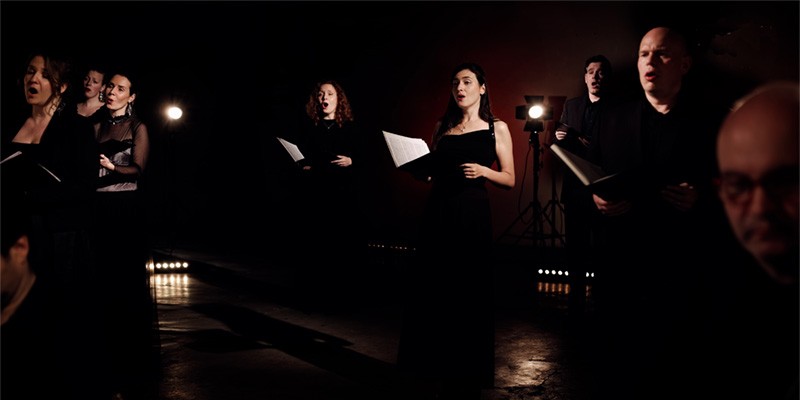Responsoria II
Jan Dismas Zelenka (1679 – 1745)
Responsoria pro hebdomada sancta ZWV 55
Ecce vidimus eum
Tristis est anima mea
O vos omnes
Unus ex discipulis meis
Caligaverunt oculi mei
Collegium 1704 & Collegium Vocale 1704
Václav Luks | conductor
Theatre X10, Prague
Concert created in cooperation with Theatre X10.
Collegium 1704
violoncello
Hana Fleková
double bass
Luděk Braný
organ
Pablo Kornfeld
theorba
Jan Krejča
Collegium Vocale 1704
soprano
Helena Hozová, Tereza Zimková, Pavla Radostová
alto
Aneta Petrasová, Kamila Mazalová, Daniela Čermáková
tenor
Ondřej Holub, Čeněk Svoboda, Václav Čížek
bass
Tadeáš Hoza, Lukáš Zeman, Martin Vacula

Jan Dismas Zelenka: Responsoria pro hebdomada sancta
Zelenka’s responses for the three principle days of Holy Week form a self-contained collection with texts taken from the so-called Morning Prayers of the church which are collectively entitled in Latin as Divinum Officium (Divine Office). The Latin term officium means “duty” or “obligation”. From the fourth century AD, it was particularly in diocesan towns and monasteries where the Officium and the Mass became developed into their fixed forms; the monks and clergymen were obligated to recite these texts at specific times of the day. The inspiration for these common and officially codified prayers was Old Testament Judaism. The extensive varied conglomeration of texts with different forms and genres have been collected in volumes evolving over many centuries up to the present day in which the prayers were meticulously ordered according to each single day of the ecclesiastical year. These prayers divide time and fill it, providing it with content and rhythm and transform profane time into sacred time.
What role did the Holy Week Matins play in musical life at the Saxon-Polish court in Dresden? August the Strong’s change of confession in 1697 precluded an inherent tradition of this type of church service; the installation of a Catholic court chapel in a converted opera house (1708) and the establishment of appropriate ecclesiastical music both progressed haltingly despite extensive efforts. During the initial period, the Matins can only have been performed ‘choraliter’ in the form of plainsong. After the marriage of the Saxon crown prince with the Duchess Maria Josepha, the music of the court chapel became more intensively involved in the structure of the church services at court from 1721 onwards. Surprisingly, it was not the court musical director Johann David Heinichen (1683-1729) who received a commission to compose music for the Matins during Holy Week in 1722, but instead the double bass player Jan Dismas Zelenka (1679-1745).
Zelenka had come to the Saxon court from Prague in 1710 and had then enjoyed the privilege of a study sojourn in Vienna with the imperial court music director Johann Joseph Fux (1660-1741) which was financed by the Dresden court. On his return to Dresden, Zelenka initially resumed his former position as double bass player and was increasingly charged to undertake the musical direction of church services alongside the court music director and the “compositeur de la musique italienne”, Giovanni Alberto Ristori (1692- 1753). The invitation to compose music for Matins during Holy Week was probably issued personally by the electress princess Maria Josepha, a descendent of the Hapsburg dynasty, who had been familiar with the corresponding custom at the Vienna court and thereby provided the initial spark igniting the subsequent ecclesiastical musical activity at the Dresden court. Six Lamentationes Jeremiae Prophetae ZWV 53 were duly produced, but the 27 Responsoria pro hebdomada sancta ZWV 55 which were also begun in 1722 according to the autograph score were not completed until the following year.
Responsoria pro hebdomada sancta are considered one of Zelenka’s most important compositions and they have become synonymous with his masterful command of counterpoint. Zelenka himself apparently considered them highly significant, and his contemporaries retained interest in them even after the composer’s death. Text and music unite so masterfully here that in the realm of Baroque music, it would be difficult to find a parallel for the resulting urgency and emotional depth.

J. D. Zelenka: Responsoria pro hebdomada sancta
Ecce, vidimus eum
Ecce, vidimus eum non habentem speciem, neque decorem: aspectus eius in eo non est:
hic peccata nostra portavit, et pro nobis dolet:
ipse autem vulneratus est
propter iniquitates nostras:
Cuius livore sanati sumus.
V: Vere languores nostros ipse tulit,
et dolores nostros ipse portavit.
Lo, we have seen him
Lo, we have seen him
without comeliness or beauty:
His look is gone from him:
he hath borne our sins and suffered for us:
He was wounded for our iniquities:
by his stripes are we healed.
V: Truly he hath borne our infirmities
and carried our sorrows.
Tristis est anima mea
Tristis est anima mea
usque ad mortem:
sustinete hic, et vigilate mecum:
nunc videbitis turbam,
quae circumdabit me:
Vos fugam capietis, et ego vadam
immolari pro vobis.
V: Ecce, appropinquat hora,
et Filius hominis tradetur in manus peccatorum.
My soul is sorrowful
My soul is sorrowful even unto death:
stay here and watch with me:
now shall ye see the crowd
that shall surround me:
ye shall take flight, and I shall go
to be offered up for you.
V: Behold the time draweth nigh,
and the son of man shall be delivered
into the hands of sinners.
O vos omnes
O vos omnes, qui transitis per viam,
attendite et videte si est dolor sicut dolor meus.
V: Attendite, universi populi,
et videte dolorem meum.
O all ye that pass by
O all ye that pass by, behold and see
if there be any sorrow like unto my sorrow.
V: O all ye nations,
behold, and see my sorrow.
Unus ex discipulis meis
Unus ex discipulis meis
tradet me hodie:
Vae illi perquem tradar ego.
Melius illi erat, si natus non fuisset.
V: Qui intingit manum mecum in paropside,
hic me traditurus est
in manus peccatorum.
One of my disciples
One of my disciples shall betray me this night.
Woe unto that man by whom I am betrayed!
It had been good for that man
if he had not been born.
V: He that dippeth his hand with me in the dish,
the same shall betray me
into the hands of sinners.
Caligaverunt oculi mei
Caligaverunt oculi mei a fletu meo:
quia elongatus est a me,
qui consolabatur me:
Videte, omnes populi.
Si est dolor similis sicut dolor meus.
V: O vos omnes, qui transitis per viam,
attendite et videte.
Mine eyes do fail with tears
Mine eyes do fail with tears,
because the Comforter that should relieve me
is far from me.
Behold, O all ye nations,
if there be any sorrow like unto my sorrow.
V: O all ye that pass by,
behold, and see.


